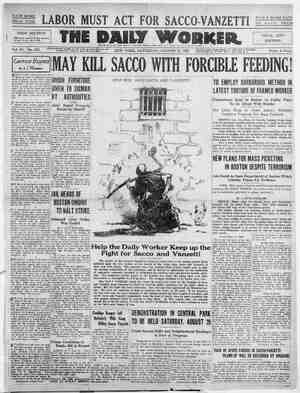The Daily Worker Newspaper, August 13, 1927, Page 12
You have reached the hourly page view limit. Unlock higher limit to our entire archive!
Subscribers enjoy higher page view limit, downloads, and exclusive features.
® —Drawing \ A ¢ ~Ag STS by William Gropper The Paris Congress of the Amsterdam International (Continued from Page Six) tions coal supplies encumbent upon them,” fhe French by reference to the’ inflation. The questions of reconstruction and, rationaliza- tion occupy 10 pages. We are here told that as early as 1910 Messrs. Oudegeest and Jouhaux had the proper recipe for the salvation of the world’s economy in their pockets. It only lasted rather long hefore the capitalists would consent to make use of it. ; To what extent the policy of Amsterdam brought about an improvement in the questions of recon- struction and rationalization (for this is surely the main point, if the query is not impertinent), is a matter on which no words are lost. Nor would it be easy to prove. The loss of the eight-hour day all along the line, the defeat of the British miners, and other like occurenees can surely not be looked upon as “proper steps for the purpose of bringing about better conditions” for the workingclasses. In the realm of social politics the achievements of Amsterdam are equally great. Not even so im- portant a man as Oudegeest can deny that no prog- ress has been made in the matter of the eight-hour day. At any rate, the I. F. T. U. had called upon the workers “to meet the offensive of the employers on the eight-hour day in favor of the right of co-op- eration and co-decision.” That this must not be effected by inciting a ruth- less class-war is obvious in view of the general at- titude of Amsterdam in questions of reconstruction. Let us still see what the report has to say on the subject of Amsterdam’s fight against war, reaction and fascism. Proud reference is made to the fine decisions of Rome and the Hague in 1922. That no action was taken on the very next oceasion, that of the French and Belgian occupation of the Ruhr in ~ 1923, is put down to the fact that the competent facters were “still too weak.” ‘ “In 1924 the Pan-American Federation of La- bor appealed to the I. F. T. U. to prevent the rebels opposing President Obregon in Mexico from being supplied with ammunition from Europa” To cover up the fact that Amsterdam does prac- tically nothing against the danger of war and “has obviously no serious intention of ever doing any- thing in future against it, the report approaches the League of Nations with a suggestion in nine articles, worked out by Oudegeest, Jouhaux and Thorberg, “for the control of the international traffic in arms by means of a mixed committee.” . Surely nothing more ridiculous could be imagined than a mixed com- mittee of the war-mongers for the control of the traffic in arms. While shamefully ignoring the~-fact that the rogues formerly leading the Italian Trade Union Confederation went over into the fascist camp with D’Arragona at their head, the report boastfully states that “no occasion is neglected of protesting in the press reports of the I. F. T. U. (which are read by nobody) against the misdeeds of the fas- cists.” As a matter of secondary importance it is stated that there is no possibility of helping the Italian trade unions at present, in the first place for lack of funds and secondly in view of the -futility of opposing the fascists. The report then goes on to speak of a series of questions of lesser interest. We may, however, con- tent ourselves with an extract in regard to the most important problems of the international trade union movement, Any trade union member who is not utterly blind as a result of the silly reformist twaddle about the alleged crimes of Moscow and the Communists against the labor movement, must ask himself of what use such a body as the I. F. T, U. can possibly be to the workingclass. “To no ques- tion of the labor movement does Amsterdam give a definite answer, nay, what is worse, the international problems are not even brought upon the tapis. In their complete incapacity. to see what is happening in the labor world, the reformist gods of Amsterdam sit on the throne of their bogus international and talk twaddle about the stupidity of the working masses and the Communist opposition, which makes it So hard for Messers’ Jouhaux, Oudegeest and Sas- senbach to lead the workers into the promised land of a reconstructed capitalism in which they shall be allowed to collaborate in increasing the capitalist profits indefinitely. “It is not to be expected that at the Paris congress the trumpets will sound and shake down the walls of Amsterdam with their clar- ion peal. On the contrary, the few members of the opposition will hardly be allowed to say a word, and if they do so their remarks will be drowned in the general tumult. On the other hand, the well-sifted society of augurs will tell. each other that all is well, and the chosen leaders will remain the- chosen leaders. In secret, meanwhile, they will call each other names, seeing that all know that, once the imperialists start to attack one another again, each of them will once more stand by his national exploit-° er under the parole of “Gott strafe England” or whatever else it may be. It-is only by the liquidation of the Amsterdam spirit in the labor movement and by the destruction of that reactionary clique of leaders which calls itself the I. F. T. U. that the trade union movement _ ean rise again, regain its strength, and become a militant international proletarian unit, That is the unmistakable teaching of the report of the Paris Congress of the I. F. T. U.




